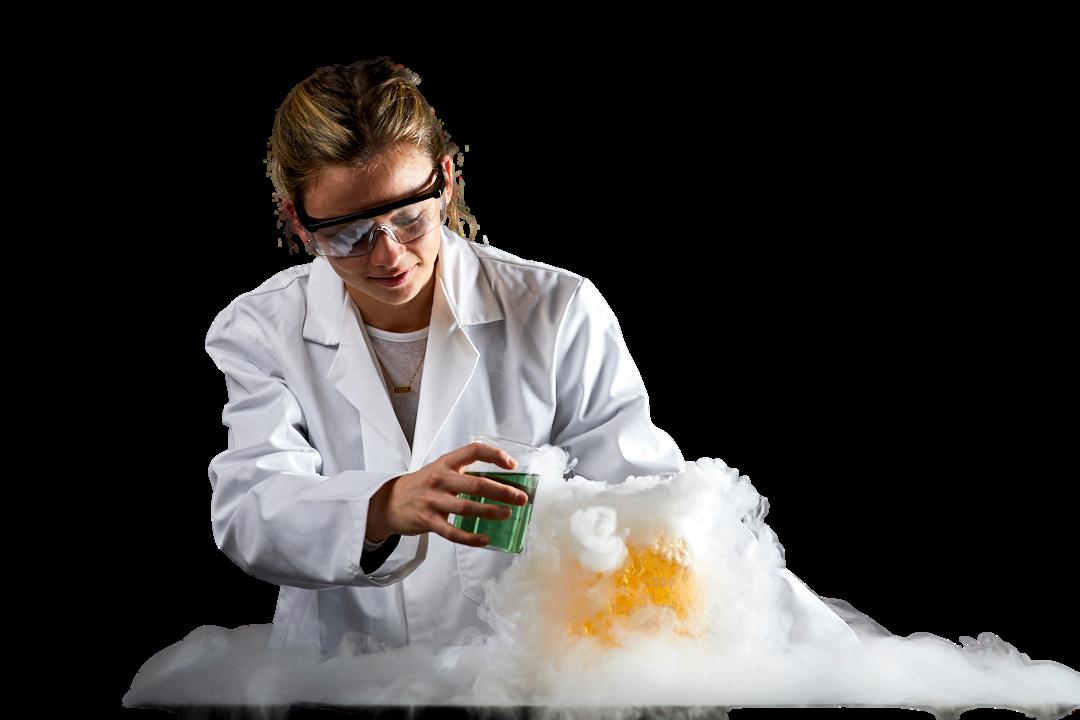





All students study four core subject Mathematics, and Science—alongside fou to a minimum of nine GCSE qualificatio strengths and interests when making the with what you enjoy and excel at. Some of you may already have a clear id others might still be weighing up how be Regardless of where you are in the proce are here to offer guidance and support. thoughtful choices that will lead to success
You and your parents will have the oppor teachers during a dedicated Options E finalised, they will be confirmed through th If you wish to make changes after you discussed with your teachers and ar amendments will require the completion of This is an exciting step in your education, and informed choices.


All students receive help with their GCSE choices during PSHE sessions as well as from their Form Tutor, Head of Year and Careers team:
In the early stages of your decision-making you will be given an opportunity to consider how to make choices based on your strengths and aptitudes. You will be looking at approaches to careers and choices.
There are a variety of useful books and Careers pages on Firefly. You are most welcome to use these books for reference.
Your options are your choice but conversation with your parents will be helpful.

We advise you to follow a broad and balanced course. More than one Modern Foreign Language may be chosen and studying a language is strongly recommended.
Not many students aged 13 and 14 in Year 9 have a clear idea of which higher education course, apprenticeship, or career path they are going to follow. For this reason, it is sensible for you to choose as broad a range of subjects as possible in order not to limit your future choices. A well-trained and qualified entrant into higher education or the world of work needs a broad and balanced program of study which is the reason we provide a strong core curriculum with a wide variety of optional subjects for you to choose from.
Factors influencing your choice will include your subject interest, academic interests and ability, course content, your talents (perhaps linguistic, artistic, sporting or creative) and career aspirations.


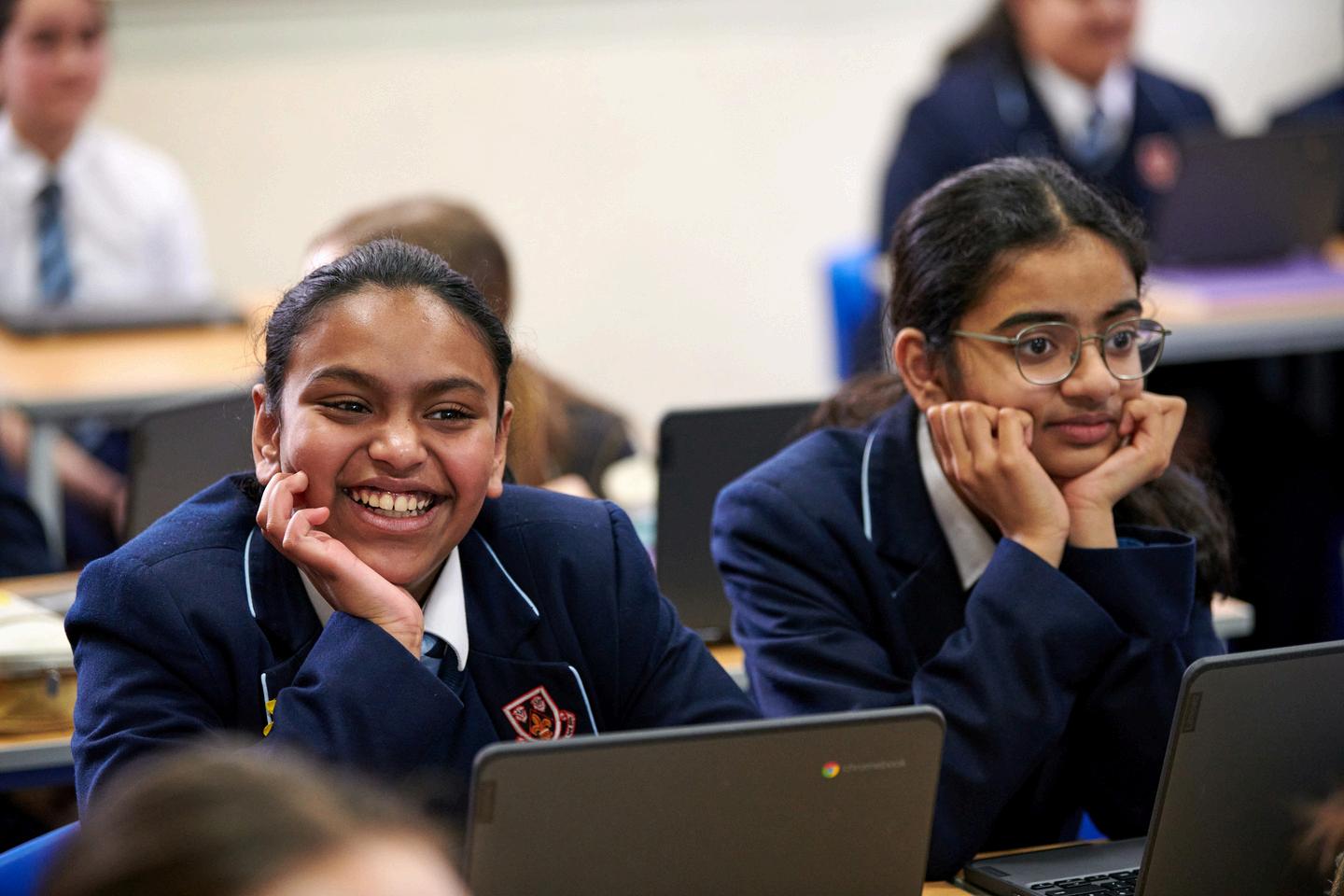






(as Combined Science:
two
We would also normally expect, and we strongly recommend in most cases, that students continue with their study of at least one modern foreign language There may be opportunities for some students to enter for further qualifications in Further Mathematics and/or Further Science. This will be discussed and agreed at the appropriate point during the GCSE Course.

AQA English Language (8700)
100% Written examination for Paper 1 and Paper 2
Presentation (Non-exam assessment) for speaking and listening
You will study a series of units designed to develop your speaking and listening, reading and writing skills in integrated and challenging ways. Your teacher will focus on the development of your skills with the aim of bringing out the best in you, spending time on areas where more experience and practice is needed, and moving at a pace where competency is high. You will read and respond to a wide range of texts produced for varying audiences and purposes, in differing contexts. These will include media and non-fiction texts, and literary non-fiction texts (such as autobiography, biography, letters, memoir, travel/adventure writing). You will learn how best to analyse and annotate these texts. You will develop and practise the skills of writing in description, narrative and opinion writing. You will talk about your work and undertake a range of speaking and listening activities, designed to build your confidence and skill, particularly when discussing and presenting.
At the end of the course there are two examination papers to test your reading and writing skills. Each lasts 1 hour and 45 minutes. On Paper 1, you will read and then respond in detail to a single fiction text, completing a series of questions. You will then complete one task which tests your ability to write description or narrative. On Paper 2, you will read and respond to two non-fiction texts, completing a series of questions. You will then complete one writing task which tests your ability to argue a point of view.
What could I go on to do?
English Language is a core qualification and is a requirement for entry into all university and college courses and many areas of employment. In addition, the achievement of a good grade indicates that you have the important transferable skills necessary for success in many A-level subjects and university courses.

CIE English Literature IGCSE (0992)
75% examination (2 papers), 25% Coursework
English is compulsory for all students, and leads to two separate GCSEs – English Language and English Literature.
You will study a series of units designed to develop your speaking and listening, reading and writing skills in integrated and challenging ways. Your teacher will focus on the development of your skills with the aim of bringing out the best in you, spending time on areas where more experience and practice is needed, and moving at a pace where competency is high.
You will read and respond to a wide range of texts produced for varying audiences and purposes, in differing contexts. These will include media and non-fiction texts, and literary non-fiction texts (such as autobiography, biography, letters, memoir, travel/adventure writing). You will learn how best to analyse and annotate these texts. You will develop and practise the skills of writing in description, narrative and opinion writing. You will talk about your work and undertake a range of speaking and listening activities, designed to build your confidence and skill, particularly when discussing and presenting.
Your speaking and listening skills will also be tested over the course. You will give a presentation which your teacher will mark.
You will take examinations in the AQA GCSE for English Language, and CIE IGCSE for English Literature.
What could I go on to do?
You will continue to develop your analytical and original writing, and to read works of poetry, prose and drama, including Shakespeare.
Every career uses English skills – you will always have to communicate effectively in speech and writing, whatever you go on to do.
Particular areas of further study that former students have followed include law, P.P.E., media and journalism, TV, radio, advertising, or more diverse areas such as business management, education, philosophy, even artificial intelligence; as well as more specific English subjects, including Linguistics. Aspirant medics have successfully studied English Literature at A level, as a demanding textbased subject, to show intellectual range.

Pearson Edexcel International IGCSE Specification (4MA1)
Examination papers 1 and 2 with equal weighting at 50%. Both papers 1 and 2 allows the use of a scientific calculator.
GCSE Mathematics covers a wide range of basic mathematical knowledge and skills grouped into four areas:
Number and algebra
Shape, space and measure
Data handling
Using and applying Mathematics
AQA Level 2 Certificate in Further Mathematics (not core)
Students who are in set one out for Mathematics will complete the same GCSE in Mathematics as the rest of the year group. Alongside this they will work towards gaining the equivalent of an additional GCSE in Further Mathematics. The AQA Level 2 Certificate in Further Mathematics is graded on a five-grade scale 9-5.
Mathematics is a creative discipline. The language of Mathematics is international. The subject transcends cultural boundaries and its importance is universally recognised. Mathematics has developed over time as a means of solving problems and also for its own sake. Mathematics can stimulate moments of pleasure and wonder when students solve a problem for the first time, discover a more elegant solution, or notice hidden connections.
You will tackle problems through a range of methods, including mental, written and with a calculator, using increasingly complex mathematical language and reasoning. As you progress, you learn to appreciate the unique power of Mathematics as an analytical tool for solving problems.
A GCSE qualification in Mathematics is a requirement for entry to all universities and colleges.

AQA Combined Science: Trilogy (8464) - (represents two GCSE Qualifications for those students who study Combined Science)
AQA Biology (8461)
AQA Chemistry (8462)
AQA Physics (8463)
The most common option nationally, there are two Biology, two Chemistry and two Physics examination papers of 1 hour 15 minutes each. The overall grade is determined by the total marks achieved across all six papers. All papers are taken at the end of the course, and there is no internally assessed coursework.
See Firefly for course content of each science.
Everyone takes at least Combined Science. Some of you may opt use one of your four option choices and choose Triple Science.
The Scheme of Assessment is linear, with six question papers (two in each science area) to be taken in the same examination series. This means that you will take the entire set of examinations at the end of the course when you are in Year 11. Paper 1 and Paper 2 in each of the Science subjects will contain questions relating to practical skills which have been built up throughout the course. You will receive two grades based on your overall performance on all papers. (E.g. 9-9, 9-8, 8-8 etc).
In Combined Science you will study Biology, Chemistry and Physics, taught by specialist teachers for 4 lessons per 2-week cycle for each Science subject. Because Combined Award Science is studied in less time than Triple Science you study the core topics in each of Biology, Chemistry and Physics whereas students taking Triple Science will study some additional topics in each Science. The content of Combined Award Science is described under Biology, Chemistry and Physics on this page.
In Triple Science you will study Biology, Chemistry and Physics, each taught by specialist teachers, with 6 lessons per 2-week cycle for each subject. This course leads to a GCSE award in each subject so that you finish up with three Science awards. You will study the same core of work as students doing Combined Award Science but have to do additional material in each Science subject. The extra work is not harder than Combined Award Science but is work of the same standard; students doing Triple Science simply do more work but of the same standard.
What could I go on to do?
Biology leads to a wide range of courses and careers with students regularly going on to study Biology and related courses e.g. Biochemistry, Zoology, Marine Ecology, Equine Science, Psychology, Dentistry, Medicine, Veterinary Science, Optometry, Physiotherapy and other science and non-science degrees.
Chemistry leads to a wide range of careers with students regularly going on to study courses in Chemistry and related courses e.g. Pharmacy, Veterinary Science, Dentistry, Medicine, Biochemistry, Food Science, Chemical Engineering and Forensic Science and other science and non-science degrees.
Physics leads to a wide range of courses and careers with students regularly going on to study courses in Physics, e.g. Astrophysics and various forms of Engineering, Dentistry, Medicine, Veterinary Science, Optometry, and other Science related degrees.

AQA Art & Design: Fine Art (8202)
Component 1: 60% Coursework Assessment
Component 2: 40% Externally Set Assignment
Completion of an exam project, culminating in a practical exam.
GCSE Art and Design is a natural progression from Years 7-9. A strong foundation has already been established in the use of techniques and materials. Building on from these skills students will have the opportunity to work with a range of scales, materials and new techniques within Art and Design. Through guided lessons, visits and workshops we aim to provide our students with a personalised and developmental approach and to actively engage in and appreciate the process of Art and Design.
What could I go on to do?
Each of the two components studied over the two year course enables students to develop their ability to actively engage in the processes of Art and Design – to build creative skills through learning and doing, to develop imaginative and intuitive ways of working and develop knowledge and understanding of media, materials and technologies in historical and contemporary contexts, societies and cultures.
Communicating visually in an ever expanding digital world where businesses have online and social media platforms is a skill that is becoming more advantageous. Self-direction, confidence, dexterity, communication skills, critical analysis, research skills, problem solving and imagination are all key skills that a GCSE in Art and Design can offer and when taken alongside other subjects, can open up many possibilities and routes to a wide variety of career options.
Further study is possible across a wide range of subjects including: Architecture, Interior Design, Art Therapy, Photography/Medical Photography, Fashion Design, Journalism, Art History/History, Illustration, Advertising, Marketing/Business, Medicine/Dentistry and Law.

AQA Art amd Design: Textiles Design (8204)
60% - Portfolio of work set and marked by centre and externally assessed
40% - Externally set task marked by centre
GCSE Art and Design is a natural progression from Years 7-9. A strong foundation has already been established in the use of techniques and materials. Building on from these skills students will have the opportunity to work with a range of scales, materials and new techniques within Art and Design. Through guided lessons, visits and workshops we aim to provide our students with a personalised and developmental approach and to actively engage in and appreciate the process of Art and Design.
What could I go on to do?
Each of the two components studied over the two year course enables students to develop their ability to actively engage in the processes of Art and Design – to build creative skills through learning and doing, to develop imaginative and intuitive ways of working and develop knowledge and understanding of media, materials and technologies in historical and contemporary contexts, societies and cultures.
Communicating visually in an ever expanding digital world where businesses have online and social media platforms is a skill that is becoming more advantageous. Self-direction, confidence, dexterity, communication skills, critical analysis, research skills, problem solving and imagination are all key skills that a GCSE in Art and Design can offer and when taken alongside other subjects, can open up many possibilities and routes to a wide variety of career options.
Further study is possible across a wide range of subjects including: Architecture, Interior Design, Art Therapy, Photography/Medical Photography, Fashion Design, Journalism, Art History/History, Illustration, Advertising, Marketing/Business, Medicine/Dentistry and Law.

Pearson Edexcel GCSE Business (1BS0)
Two × 1hr 30mins examinations papers. Both papers have a range of styles of questions, including multiple choice, short answer questions, calculations, and longer answer case study based responses.
How and why do business ideas come about? How do different business situations affect business decisions? How does a business go about marketing its products, or deciding on the best price for its services? How does a business go about recruiting the right staff and motivating them to keep working well? How does a business obtain the finance to even start trading to begin with, and how does it raise more? What are the challenges of getting the product from factory to customer, and how does it do that in the most cost-effective way? What are the external influences on a business and how should it react in an ever-changing globally competitive environment?
The GCSE Business course helps to equip students with the skills and confidence to explore the answers to all of these questions and more. Exploring the world of small businesses through the lens of an entrepreneur, the course is designed to enable students to explore business concepts, terminology and objectives. You will also study the integrated nature of business activity and the impact of business on individuals and wider society, whilst also understanding business issues in local, national and global contexts. Ultimately though, the aim is to develop students as enterprising individuals with the ability to think commercially and creatively, to demonstrate business acumen and draw on evidence to make informed business decisions and solve business problems.
What
The course acts as a good foundation for A Level Business or Economics, but will also help to develop transferable skills that are useful in other subjects such as the ability to analyse both quantitative and qualitative information whilst evaluating different problems.
It will encourage students to make more informed choices about a wide range of further learning opportunities and career pathways as well as develop life skills that enable them to become financially and commercially aware. As such, it is a good foundation course that prepares students for more advanced study or has a direct application to future employment opportunities.
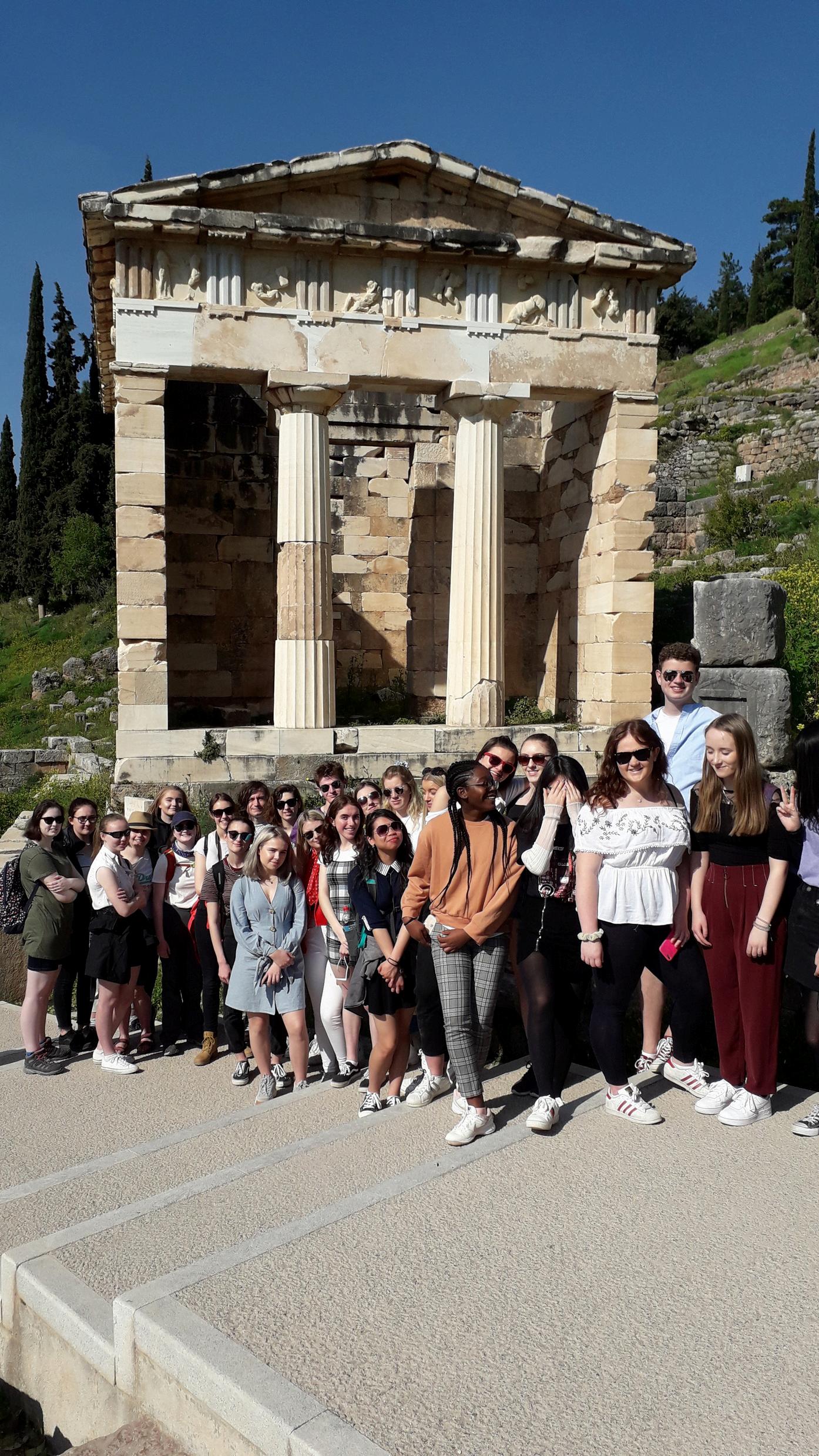
OCR GCSE Classical Civilisation (J199)
Paper 1: Thematic study, 1h 30 mins, 50%
Students study Myth and religion; this will involve a comparative study of ancient Greece and Rome, and combine literary and visual/material sources.
Paper 2: Literature and Culture, 1h 30 mins, 50%
Students couple an in-depth cultural study of Roman City Life with the study of the related body of literature.
You DO NOT need to have studied Classics in Year 9 to choose this course for GCSE, but you do need to have an interest in the ancient world of the Greeks and Romans.
OCR is clear that students who have not studied Classical Civilisation before are not at a disadvantage. We find that all interested and motivated students enjoy the course and do well. There is a considerable amount of reading in this course, as well as the study of visual material, and you need to be able to express your ideas fluently on paper. All written sources are studied in English and no knowledge of Latin or Greek is required.
Two components are studied and are assessed at the end of the course in two examinations. Each component is wide-ranging and allows you to explore a number of related topics. The prescribed sources of information provide an opportunity to study and compare the ancient Greeks and Romans through their literature as well as their art, architecture and archaeological remains.
Myth and religion
Roman city life
What could I go on to do?
Classical Civilisation equips students with readily transferable, analytical skills. A wide variety of source material, ranging from literature through art and architecture to archaeological evidence, is studied and great stress is put upon understanding and appreciating the values of other cultures. The course stimulates discussion and helps students to formulate their own ideas on a diverse range of subjects which are highly relevant to today’s world. Classical Civilisation therefore fits very well in most subject combinations. The GCSE course also provides excellent preparation for those students wishing to continue the study of Classical Civilisation at A Level through the OCR course.
Pearson Edexcel GCSE Computer Science (1CP2)
Paper 1: Principles of Computer Science
Written Exam - 1h 30 mins, 50%
In order to become proficient computer scientists, it is essential that students have knowledge and understanding of the field’s fundamental principles and concepts.
Paper 2: Application of Computational Thinking
Practical Exam - 2 hours, 50%

Learning to program is a core component of a computer science course. Students should be competent at designing, reading, writing and debugging programs. They must be able to apply their skills to solve real problems and produce readable, robust programs under examination conditions.
GCSE Computer science is all about solving problems. Above all, you should have a curiosity for how things work!
The course gives you an in-depth understanding of how computer programs, software and apps are designed and made. The largest component of the course will involve you learning the Python programming language. Once mastered, you may even be able to write your own simple computer games! You will receive a thorough grounding in problem-solving and algorithm design using abstraction, decomposition and flowcharts.
In addition to practical programming, the course contains numerous computer science theory elements. These include the parts that make up a computer (such as memory, motherboard, graphics card and processor) and how they function. Students look at computer networks and pay particular attention to the Internet, and how it has developed from simple beginnings to the biggest network in the world. You will also study security issues such as hacking, data interception and theft, and how to design secure systems to avoid them.
Students also learn the mathematics that underpins the subject including binary and hexadecimal conversions/calculations.
Another element of the course deals with “e-waste” and the negative impacts of the computer industry with regards to pollution and climate change. You will also look at the problems that humans face as we run out of the rare and finite resources needed to manufacture the tech that is all around us.
What could I go on to do?
Computing and computer technology are part of just about everything that touches our lives, from the cars we drive, to the movies we watch and the way we do business.
Computer Science has made possible many of the most exciting developments in recent years, and Computer
Science researchers are at the forefront of developing new ideas such as self-driving cars, robots, automation, computer games and virtual reality.
As well as A Levels, you can go on to study Computer Science at university as a sole subject, or as part of many Science and Engineering courses. You could even study Computer Science with Philosophy, and tackle the big questions surrounding Artificial Intelligence. Computer games have become a billion-dollar industry and with computer science qualifications under your belt you could even embark on a career as a computer game programmer or a software engineer.
In addition to traditional university courses there is also a range of Higher and Degree Apprenticeship routes that students can follow in computer science. These allow students to study towards a qualification at the same time as gaining invaluable industrial experience in a field of their choice. These routes have become increasingly popular in recent years.
AQA GCSE Design and Technology (8552)
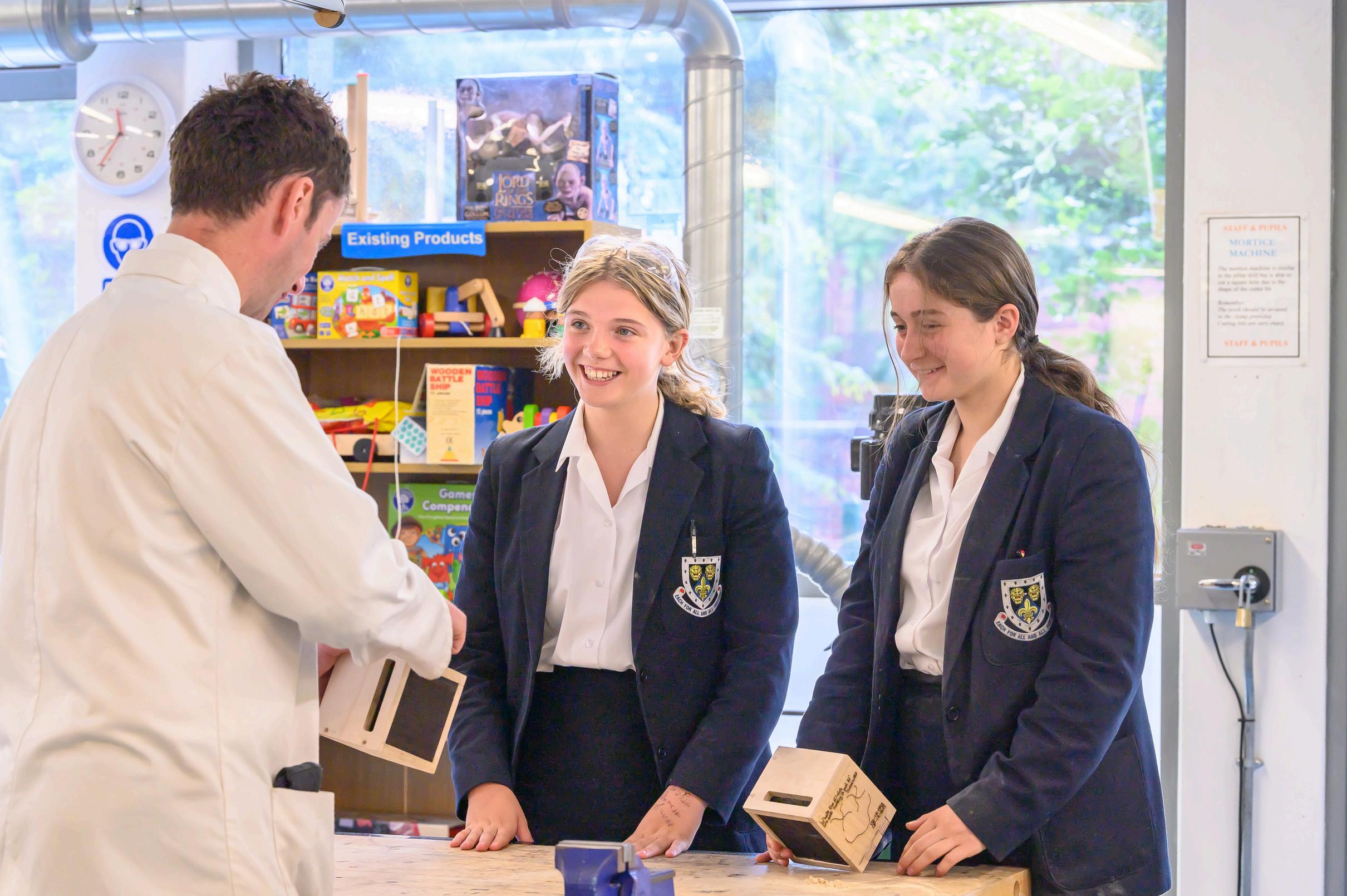
50% NEA -
Iterative design challenge, Design Folder + Product/Prototype Internally assessed, externally moderated
50% Examinationon principles of Design and Technology
This course is an extremely interesting option that will allow you to work in a wide range of materials to design and make innovative products, providing you with a broad base of skills that will prove useful within your other GCSE subjects, as well as your future education and careers.
Work will consist of related theory, relevant demonstrations and practical tasks connected to specific areas of study. Presentation and graphical techniques plus model making, CAD/CAM and ICT will be learnt and play an important part in this subject, being used where relevant within the Iterative Design Challenge.
You will be expected to design and make innovative prototypes from a given context using a combination of materials. The making will take the form of a model, a prototype or a fully functional product.
You will work from a context to produce 'live' portfolio briefs, where a genuine need or situation has been identified, explored, and overcome within the boundaries of this course. Where possible you should include input from an outside source e.g. Manufacturer, Designer or any other relevant sector of industry/ commerce.
Design and Technology is a good option to choose for someone with sound design and make skills. Those with graphical and presentation abilities who can communicate their ideas using a variety of media should do well within Design and Technology.
What could I go on to do?
Higher Education institutions view the subject very favourably as it indicates curricular diversity and an ability to use a wide range of skills. Girls who study Design and Technology can progress further to careers in engineering, design, architecture etc. providing an excellent balance of creative studies with some of the more theoretical subjects offered.
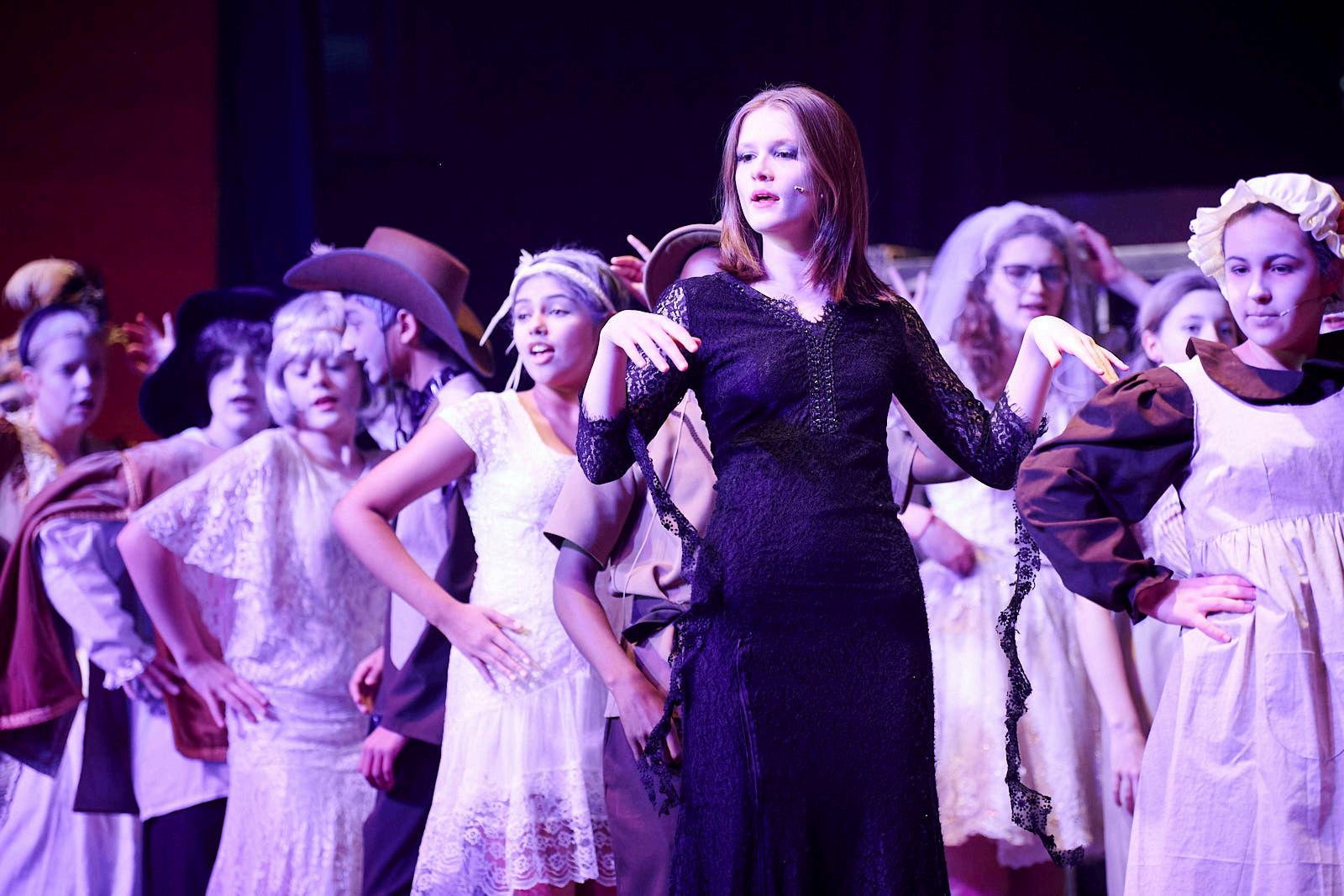
AQA GCSE Drama (8261)
40% - Component 1 - Understanding Drama, Written Examination
40% - Component 2 - Devising drama (practical rehearsal and performance
20% - Component 3 - Texts in practice (practical rehearsal and performance)
There are no previous qualifications needed, but you require an obvious interest and enthusiasm for the subject and a commitment and ability to complete practical coursework in groups. Imagination, creativity, the ability to adapt and concentration are the main qualities you will need. You will also need determination and resilience in the face of challenges to which there may be no obvious solution or answer.
You do not have to be an actor, performer or have performing experience as your interest in theatre can be developed through a technical skill, such as costume or sound design.
Although the course is very practically based, the new specification places a greater emphasis than before on the ability to reflect upon and explain drama through the written word. Therefore, confidence with written English would be helpful.
The course engages and encourages students to become confident performers and designers with the skills they need for a bright and successful future.
Students learn to collaborate with others, think analytically and evaluate effectively. They gain the confidence to pursue their own ideas, reflect and refine their efforts. Whatever the future holds, students of GCSE Drama emerge with a toolkit of transferable skills, applicable both in further studies and in the workplace.
Employers and universities look for self-confidence, adaptability, the ability to work and co-operate in groups and communication skills, all of which are developed through this course. They also value students who can think creatively and problem-solve independently.
Careers in acting and performing can be challenging but often reward those who are determined and self-reliant. The course also looks to stimulate interest in the wealth of design careers available in theatre and film production, in which the UK industry is a global leader.

AQA Food Preparation and Nutrition (8585)
50%
Examination on Food Preparation and Nutrition
15%
Written report on Food Investigation
35%
Written portfolio on Food Preparation
Food preparation skills are integrated into five core topics:
1.Food, nutrition and health – Macronutrients, Micronutrients, Nutritional Needs and Public Health Promotion.
2.Food science – Cooking of food, Heat Transfer and the Functional and Chemical Properties of Food.
3.Food safety – Food Spoilage, Contamination and the Principles of Food Safety.
4.Food choice – Factors affecting Food Choice, British and International Cuisines, Sensory Evaluation, Food Labelling and Marketing
5.Food provenance – Environmental Impact and Sustainability of Food, Ethics of Food Production, Food Processing and Production.
Food Preparation and Nutrition
The paper will be made up of a combination of short and long questions.
Task 1: Food Investigation
This will examine students' understanding of the working characteristics, functional and chemical properties of ingredients.
Task 2: Food Preparation Assessment
This will assess students' knowledge, skills and understanding in relation to the planning, preparation, cooking, and presentation of food and application of nutrition related to the chosen task.
What could I go on to do?
Studying food preparation and nutrition can lead to exciting and well paid career options. Consumers are becoming increasingly reliant on the food industry to develop solutions for their nutritional needs. This course could lead you into roles such as a Chef, Food Product Developer, Food Safety Inspectors, Nutritionists, Dieticians, Sports Nutrition, Quality Managers, Teacher, Food Engineer, Food Scientist, Food Technologist, Food Photographer, Food Stylist, Food Marketer, Food Journalist, Home Economist, Hotel and Restaurant Manager, Microbiologist.

AQA GCSE French (8652)
The final assessment is worth 100% of the overall exam mark and is split into four papers. The four skills of listening, reading, speaking and writing are all examined and there are two overall tiers of entry –Foundation or Higher.
In the final exams, students will demonstrate their knowledge of the language and the language learning skills they have developed throughout the course.
You will already have studied French for at least three years. A further two years' study brings you to GCSE and, on past experience, the likelihood of a very good grade. Language learning can be a great source of enjoyment as well as providing a sense of achievement. An interest in how languages work is an asset, as is the ability to learn new words quickly.
In the early stages you will be able to build on work done in previous years and make rapid progress. Familiar topics are revisited and developed and there are opportunities to revise basic grammar as well as learn new structures. New topics are introduced: broader issues such as the environment, social issues, health and fitness, tourism and travel, the world of work.
Subject content is divided into 'Themes’. These are:
Theme 1: Identity and Culture
Theme 2: Local, national and global areas of interest
Theme 3: Current and future study and employment
What could I go on to do?
You will be tested on all four skills: listening, speaking, reading and writing. You are therefore developing skills which will stand you in good stead in any situation, given the communicative nature of the course and demands made by current employers.
In the world of work, a qualification in modern languages is an enormous advantage. In the future British people will be competing with others from all over the world, many of whom are competent in two or more languages. The ability to communicate in a foreign language is a great asset in many careers.

AQA GCSE French (8652)
Method
35%
Examination on Living with the physical environment
35%
Examination on Challenges in the human environment
30%
Examination on Geographical applications
Geography matters more than ever. By improving our understanding of the world’s geography, we can better respond to events around us, and better prepare ourselves to face the global challenges ahead. GCSE Geography is a great place to start. It will inspire you to become a global citizen by exploring your place in the world, your values and your responsibilities to other people and the environment. The content focuses on current issues and is designed to motivate and challenge you. It covers key ideas and debates such as migration, natural hazards, climate change, globalisation, economic progress, urban regeneration and management of world resources.
Geography is a subject which covers a wide variety of contemporary issues and topics related to the world in which you live. It considers the linkages between natural phenomena, human behaviour, historical events and political decision making that is unmatched in other fields. The subject will appeal to you if you have an interest in and concern for the planet and the way in which humans interact with it. This is set in a world that is changing at an ever faster pace as local and national governments make decisions at breakneck speed. Just consider some recent events of the 21st century: intense climate change coupled with extreme weather, deadly tsunamis, costly wars, mass migration and an economic crisis that threatened the international system. Add to this Covid, China’s growth as a superpower, disarray in the EU and concern over the nuclear ambitions of nations. Geography has numerous dimensions and it remains a great way to begin to understand our complex world.
What could I go on to do?
Geography is an academically robust and challenging subject which spans the social and physical sciences and promotes a lifelong interest and fascination in how the world works. There are dozens of fields of specialisation, and for students contemplating a career in Geography the choice is enormous. Geography is about the interaction between people and our planet. This fascinating subject is valid in a number of different career paths, such as Marketing, Law, Surveying, Medicine, Energy, Management, Hydrology, Politics and Natural Sciences. Geographical Information Systems (GIS) are at the heart of most organisations. All industries benefit from GIS technology, and markets that are starting to integrate GIS into the core of their activity include: Insurance; Retail; Oil and Gas; Defence & National Security; Education; Local & Central Government; Public Safety; Utilities and Telecommunications. Geography is broad and will help prepare you for a huge range of employment opportunities and geography graduates experience some of the lowest levels of unemployment as a result.
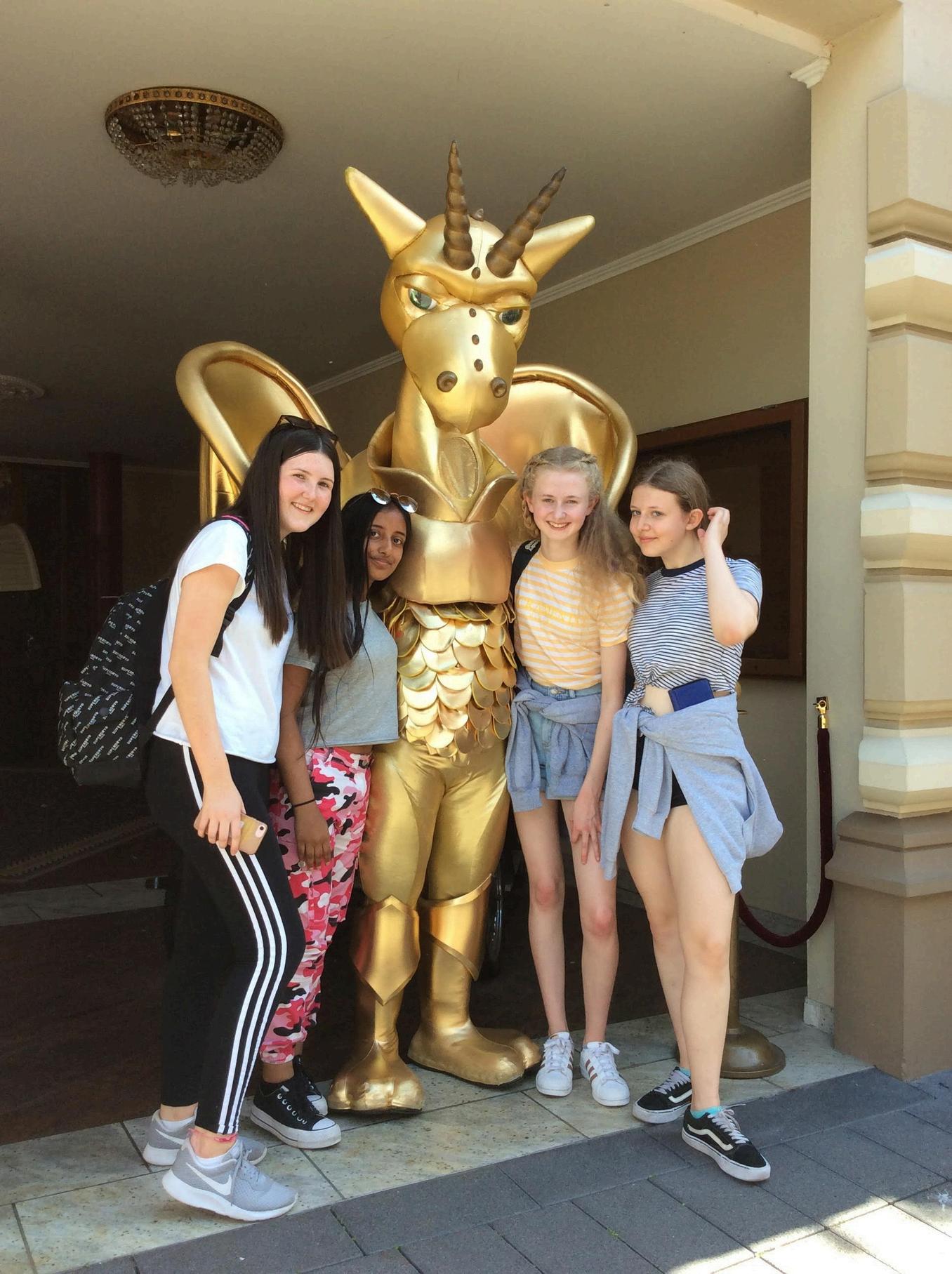
AQA GCSE German (8662)
The final assessment is worth 100% of the overall exam mark and is split into four papers. The four skills of listening, reading, speaking and writing are all examined and there are two overall tiers of entry –Foundation or Higher.
In the final exams, students will demonstrate their knowledge of the language and the language learning skills they have developed throughout the course.
In Years 8 and 9 you have become familiar with the sounds and structural patterns of German and also the culture of the German speaking countries. You already have a useful vocabulary on a wide range of everyday topics. All of this will be of great benefit as you prepare for GCSE. A strong interest in the language and a committed approach are obviously important, especially as the language is not studied in Year 7 but rapid progress brings its own opportunities and rewards for all students studying German at this level.
You will learn to understand and express your opinions on a variety of contexts and purposes:
Theme 1: Identity and Culture
Theme 2: Local, national and global areas of interest
Theme 3: Current and future study and employment
Studying a language will give you many important personal skills. You will learn to listen carefully to people from a different cultural background, to analyse ideas and above all develop communication strategies. You will need to be organised and tackle problems independently using your knowledge in a creative and imaginative way. Trying to get your message across to a "sympathetic native speaker" is a genuine challenge.
Any knowledge of languages is also a great asset when choosing a career either at home or abroad. German is a major European language. It shares its linguistic roots with English and is an introduction to Dutch, Danish and other Scandinavian languages. It is also widely used in the countries of Eastern Europe which are currently developing their economies. The German speaking countries are at the very heart of the "EU" and will feature strongly on the political and economic scene in the years ahead not only in Europe but throughout the world. You can acquire a life skill, broaden your horizons and stand out from the crowd.

OCR GCSE Classical Greek (J292)
Method
50%
Examination on Language
25%
Examination on Prose Literature A or Prose Literature B
25%
Examination on Verse Literature A or Verse Literature B
Greek may be taken as an extra GCSE only by able students who are already studying Latin in Year 9. The lessons take place at lunch-time. It is usual, though not necessary, to take Latin GCSE as well. The course is similar to that in Latin but has to move very much faster. You need to understand the principles of an inflected language (one that uses endings), be interested in the past and be prepared to work hard. You will need to have shown commitment and linguistic ability over the Year 9 Latin course. You will be introduced the Greek alphabet in your Latin lessons at the end of Year 9 and you must undertake to become confident in writing and reading it over the summer holiday before the beginning of Year 10.
The course has language and literature components. You will need to master a new alphabet and tackle "real" Greek literature less than a year after starting the course. There is a prescribed vocabulary list and no coursework.
Component J292/01: Language
This component consists of two sections which will test understanding of unseen Greek
Component J292/02 or J292/03: Prose Literature
Component J292/04 or J292/05: Verse Literature
Greek offers similar linguistic and literary advantages to Latin. It is the direct fore-runner of Modern Greek. Its vocabulary provides practically all the technical terms for modern medicine, science and technology that do not derive from Latin. Greek literature, especially the poems of Homer and the tragic plays, has been read and enjoyed for over 2,000 years.
Greek is highly regarded by employers as Classicists are prized for their logical and critical thinking, their precision and disciplined approach.
As Greek is the study of a language with a different alphabet, it counts as a skill element in the Duke of Edinburgh Scheme.

AQA GCSE History (8145)
Paper One: Understanding the Modern World:
Module 1: 25% 1-hr examination: AB Germany 1890 – 1945: Democracy and Dictatorship AND
Module 2: 25% 1-hr examination: BB Conflict and Tension: The First World War, 1894-1918
Paper Two: Shaping the Nation of Britain.
Module 1: 25% 1-hr examination: AC Britain: Migration, Empires and the People 790 to the present. AND
Module 2: 25% 1-hr examination: BA Norman England, c.1066-c.1100
GCSE History is for those who enjoy studying people - the personalities of exciting, sometimes glamorous, sometimes terrifying individuals – who, ultimately, have been responsible for creating the state of the world today; it is for those who enjoy studying dramatic, engrossing and supremely important events. It is the collective record of humanity in all of its ambiguity. To understand the past is to shed new light upon the present and to begin to appreciate the complexity and diversity of human experience.
Lessons aim to bring the subject to life for you with extensive use of debates, field trips, films and plays.
As well as interesting and exciting you, GCSE History prepares you for adult life and the world of university and work. It teaches you to think for yourself, to research, to analyse on paper and in oral debate and above all it gives you an understanding of people - a vital facet of every walk of life.
Those with a History qualification have demonstrated ability in one of this country’s most respected subjects and are well prepared for careers in virtually every area of employment, including Law, TV, Journalism, Politics, all forms of Management, Social Work and Medicine.

AQA GCSE History (8145)
Paper 1 – Latin Language 50%
Paper 2 – Latin Literature 30%
Paper 3 – Roman Civilisation 20%
Paper 1: 1h 30mins Written Examination
Paper 2: 1h 15mins Written Examination
Paper 3: 1h Written Examination
GCSE Latin follows on from the work done in years 7–9. There is a language component, which is worth 50% of the total mark, and the assessment is a mixture of comprehension and translation into English. Within this, there are some questions that assess understanding of grammar. All of this follows naturally from the Cambridge Latin style of doing things: the GCSE syllabus is written by the authors of that course.
The literature component of the course is worth 30% of the total marks, and many find this the most rewarding aspect of the course. Reading Latin literature in the original takes you directly to Roman culture and ways of thinking. In this element we read a number of extracts from a varying selection of authors, focusing on particular themes. Currently we explore 'Love and Marriage', though this theme changes regularly.
The final part of the course is Roman Civilisation and is worth 20% of the total marks. This is what students generally call “background” and will focus on the topic 'Roman Family Life'.
As well as its well-regarded traditional academic prestige, a qualification in Latin demonstrates high-level skills in language and culture to Universities and employers. Studying Latin can help your competence in other languages, and can give you an advantage over others in the perspective you will have on culture and society.
Classicists go on to a huge variety of careers; from Law, to the Civil Service and Management, to careers in Universities and financial institutions, but many people with high-level qualifications in Sciences and Maths also have qualifications in Latin.

EdExcel GCSE Music (1MU0)
60% NEA coursework2 compositions and 2 performances, 120 marks
40% Examination -
Listening/written exam of 1 hour 45 minutes, 80 marks
The solo and ensemble performances will be recorded in Year 11
The course aims to foster a greater understanding and appreciation of music through direct experience of the creative processes involved and through participation in the three primary activities - listening, performing and composing.
The course encourages you to compose in a variety of styles and mediums of your choice and to perform individually and in a chosen ensemble.
In the listening exam, you will answer listening questions based on set works you have studied, covering a wide range of styles from Baroque to Jazz, Musical Theatre, and Rock.
NB: students shouls already be receiving tuition on a musical instrument (or voice) before embarking on this course of study.
Objectives & Weighting
1.Performing 30% (coursework)
2.Composing 30% (coursework)
3.Listening and Appraising 40% (exam)
Your live performances and compositions will be assessed internally and moderated at the end of the course.
Communicating visually in an ever expanding digital world where businesses have online and social media platforms is a skill that is becoming more advantageous. Self-direction, confidence, dexterity, communication skills, critical analysis, research skills, problem solving and imagination are all key skills that a GCSE in Art and Design can offer and when taken alongside other subjects, can open up many possibilities and routes to a wide variety of career options.
Further study is possible across a wide range of subjects including: Architecture, Interior Design, Art Therapy, Photography/Medical Photography, Fashion Design, Journalism, Art History/History, Illustration, Advertising, Marketing/Business, Medicine/Dentistry and Law.

OCR GCSE Physical Education (J587)
There are 2 written papers lasting 1 hour each; the theoretical content is equally weighted with both papers being worth 30% of the GCSE grade.
Paper 1 assesses: applied anatomy and physiology and physical training
Paper 2 assesses: socio-cultural factors, sports psychology and health, fitness and well-being.
There are two practical components as apart of the Non-Examined Assessment (NEA)
the practical performance (30% of final grade) the Analysis and Evaluation of Performance (AEP) (10% of final grade)
No prior learning or level of attainment is necessary for you to undertake this course of study but an interest in sport is vital. Throughout the course of study learners are encouraged to develop an awareness of the role that sport and physical activity plays in today’s society and its application to a variety of situations. You must be confident to perform in at least three physical activities and be committed to regular participation in these sports over the duration of the course.
The course now contains a greater emphasis on theory, with two main areas of study.
Physical factors affecting performance
Socio-cultural issues and sports psychology
This qualification is suitable for learners intending to pursue
A levels, Higher Education or any career for which an understanding of the human body or human behaviour is desirable. It encourages the development of both analytical and evaluative skills that will enable you to improve performance. It involves the application of a range of disciplines, including Psychology, Sociology, Biology and Maths, which helps students to access a range of career paths and future learning opportunities.
This qualification can open the door to a range of career paths, including but not limited to:
Sports Scientist, Sports Nutritionist, Sports Psychologist, Sports Journalism, Sports Marketing and Events, Physiotherapy and a PE Teacher
However, the skills developed within this course have also led previous students to careers in:
Accountancy, Medicine, Engineering, Veterinary Medicine
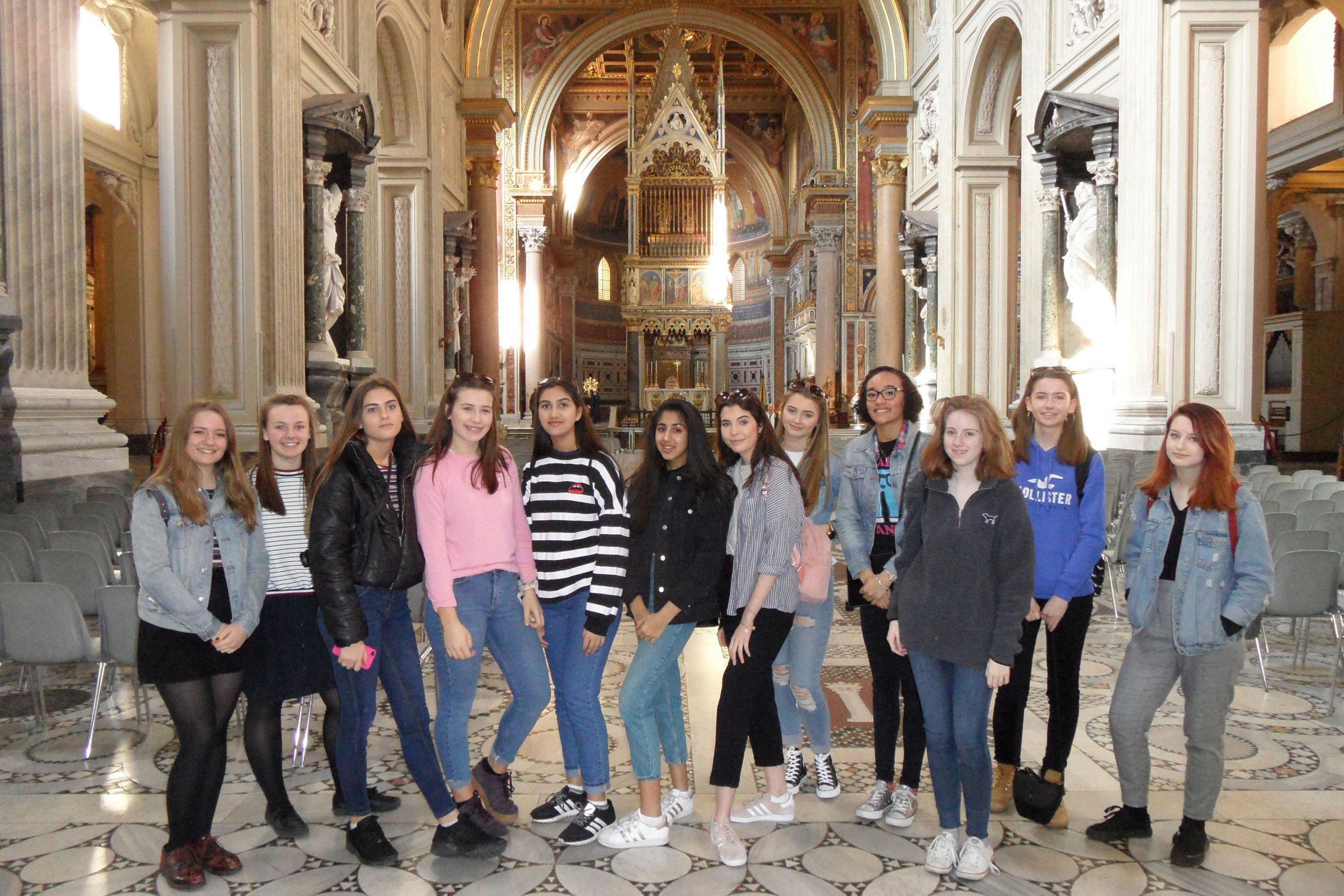
AQA GCSE Religious Studies (8062)
Component 1: Religious, Philosophical and Ethical Studies in the Modern World:
Written Examination, 1h 45 mins (50% of qualification)
Component 2: The Study of Religions: Beliefs, Teachings and Practices:
Written Examination, 1h 45 mins (50% of qualification)
This GCSE course offers students an opportunity to explore in depth a wide range of religious, ethical and philosophical concepts. It builds on the work the students have done on Religion, Philosophy and Ethics throughout Key Stage 3, therefore they will be well prepared for this GCSE. The students will also be stretched and challenged by a variety of new and different content that will foster and encourage academic inquisitiveness; a very useful skill not only within their GCSE studies, but as they move towards Key Stage 5 studies and exposure to an ever increasingly religiously aware world.
This is an exciting course which introduces students to many contemporary and relevant ideas for discussion, whilst combining these with an in depth study of the world’s two largest religions.
There are two components: The study of religions: Beliefs, teachings and practices (Christianity and Islam), and Thematic Studies evaluates a range of traditional and modern ethical and philosophical issues and debates.
Component 1: The study of religions: Beliefs, teachings and practices (50%)
Component 2: Thematic Studies (50%)
This course provides all those who study it a dynamic and engaging world view, whether that be through gaining a deeper understanding of their own faith or of a totally new way of viewing the world. The study of Christianity and Islam gives them a deep understanding of the religious beliefs and practices of nearly 4 billion people, over half of the world’s population. This religious and cultural understanding would aid any student seeking employment in the emerging economies in Asia, Western Africa and South America.
This GCSE will prepare the students for not only for their ALevel studies but also for the progression into adulthood. It allows them the opportunity to study and explore many of the pressing questions found in today’s world in a safe environment, where they are encouraged to examine ahead of finding their own way through life. The Thematic units provide students with a range of early expertise on some cultural, historical, legal, medical, moral, political and social issues, which they will be able to take forward to higher education.
AQA GCSE Spanish (8692)
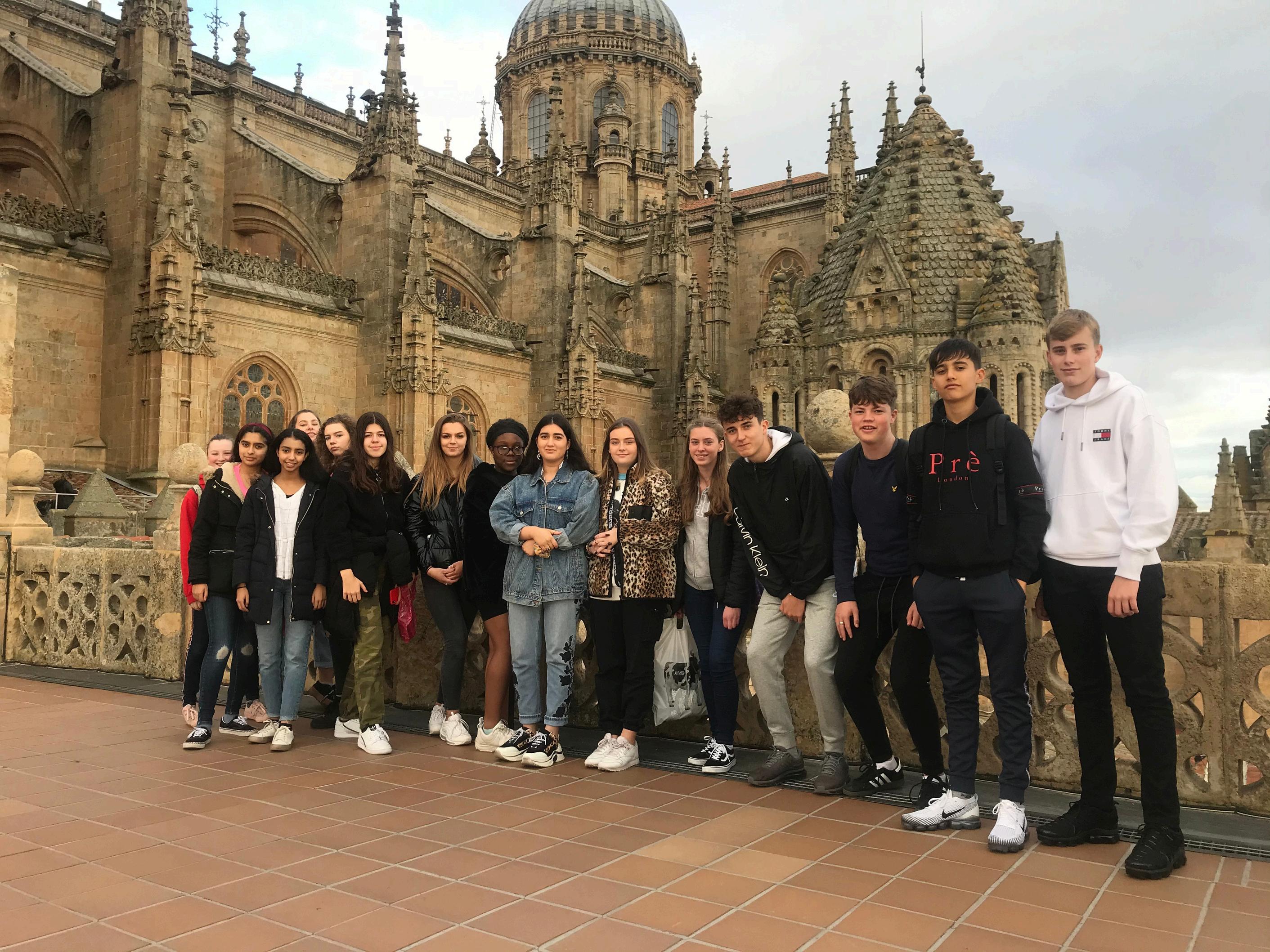
The final assessment is worth 100% of the overall exam mark and is split into four papers. The four skills of listening, reading, speaking and writing are all examined and there are two overall tiers of entry –Foundation or Higher.
In the final exams, students will demonstrate their knowledge of the language and the language learning skills they have developed throughout the course.
The GCSE Spanish course builds on the knowledge you have acquired in Years 8 and 9. It will appeal to students who enjoy communicating in Spanish and learning about different cultures. The new GCSE course will allow students to develop their written and spoken communication skills as well as their comprehension of both listening and reading material.
You will learn to understand and express your opinions on a variety of contexts and purposes:
Theme 1: Identity and Culture
Theme 2: Local, national and global areas of interest
Theme 3: Current and future study and employment
Languages are highly valued by employers and in Higher Education, not only for the ability to communicate with overseas partners, but also for the thought processes, memory capacity and cultural awareness that are acquired.
Spanish is a world language. With some 400 million speakers, it is the fourth most commonly spoken language, an official language on four continents and the mother tongue in 21 countries. It is one of the official languages of international conferences, the United Nations and the European Union. Amongst the 900 companies operating in the UK Banco Santander, the Inditex group, which owns Zara, Telefónica, and the energy company Iberdrola are major players.
Spanish could open up a world of opportunities for you.
